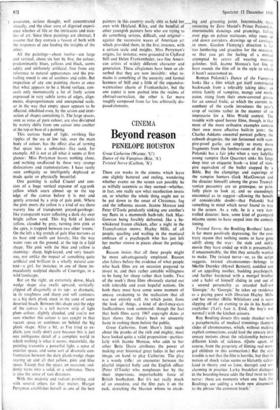CINEMA
Beyond reason
PENELOPE HOUSTON
Great Catherine (Warner, '1.1') Dance of the Vampires (Ritz, 'A') Twisted Nerve (Carlton, 'X')
There are weeks in the cinema which leave one slightly battered and reeling, wondering whether events on the screen can possibly be as wilfully eccentric as they seemed—whether, in fact, one really saw what recollection insists on, or whether the whole thing ought not to be put down to the onset of Christmas, fog and the influenza season. Jeanne Moreau and Peter O'Toole petulantly sinking one another's toy fleets in a mammoth bath-tub; Jack Mac- Gowran being forcibly defrosted, like a be- whiskered frozen chicken, after a night in the Transylvanian snows; Hayley Mills, of all people, quailing and wailing in the maniacal embrace of a psychopath who has just left her mother strewn in pieces about the potting- shed.
Reason insists that all these people might be more advantageously employed. Reason also falters before the evidence of what people who back films are on occasion prepared to invest in, and their rather amiable willingness to be hung for sheep rather than lambs. Two of the week's three films obviously started out with tolerable and even hopeful notions. On both there must have come some moment of uneasy awakening to the realisation that all was not entirely well. At which point, from the look of things, a kind of devil-may-care foolhardiness took command; though the fact that both films carry 1967 copyright dates at least shows that there's been no unseemly haste in rushing them before the public.
Great Catherine, from Shaw's little squib about the pranks of the rich and mighty, must have looked quite a valid proposition—particu- larly with Jeanne Moreau, who adds to her other Bette Davis attributes the power of making over historical great ladies in her own image, on hand to play Catherine. The play is a wordy trifle: an encounter between the playful imperial bully and the English officer (Peter O'Toole) who nonplusses her by the sheer impervious, imperturbable force of British boobydom. But it's not really much of an anecdote, and the film puts it on the rack, stretching the Shavian whims to creak- wing and groaning point. Interminable tipsy . roistering by Zero Mostel's Prince Patiomk in; interminable dancings and prancings, fall;ng over pigs on palace staircases, relay races up and down corridors, drawings up of carriage, .in snow. Gordon Flemyng's direction is Lir - too lumbering and graceless for the occasion, so that you get the feeling of a minuet attempted by actors all wearing oversize galoshes. Still, Jeanne Moreau's last line at least rounds the film off in the style to which it hasn't accustomed us.
Roman Polanski's Dance of the Vampires looks like a film which got itself constructed backwards from a tolerably taking idea: an entire family of vampires, mangy and moth- eaten, rising .from their snow-covered gra■e, for an annual frolic, at which the current in- cumbent of the castle introduces the year's crop of victims rather in the manner of an impresario for a Miss World contest. The trouble with spoof horror films, though, is that most of the more orthodox examples contain their own more effective btrilt-in jests: the Charles Addams ancestral portrait gallery, the cobweb draperies, the inn festooned with vam- pire-proof garlic, are simply so many more fragments from the lumber-room of the genre. Polanski has a fair joke when a very ladylike young vampire (lain Quarrier) sinks his fangs deep into an etiquette book—a kind of vam- pire equivalent of the bullet stopped by a Bible. But the clumpings, and caperings of the vampire hunters (rack MacGowran and the director himself) among the gross Transyl- vanian peasantry are so grotesque, so pain- fully plain to look at, and so exceedingly uncotnical as to suggest—allowing the benefit of considerable doubt—that Polanski had something in mind which never found its way to the screen. As a rule, he is a very Con- trolled director; here, some kind of graveyard miasma seems to have seeped into the comedy timing.
Twisted Nerve, the Boulting Brothers' latest, is far more positively depressing, for the con- trary reason that nothing seems to have gone adrift along the way: the stale and sickly movie they have ended up with is presumably. if unaccountably, the film they actually wanted to make. The twisted nerve—or, as the script suggests, twisted chromosomes—belongs to Marlin Durnley (Hywel Bennett), coddled son of an appalling mother, budding psychopath, and further burdened with a mongol brother and a habit of himself sliding in and out of a second personality as retarded half-wit :Georgie.' As 'Georgie,' he takes up residence as a paying guest with librarian Hayley Mills and her mother (Billie Whitelaw) and is soon slipping off of an evening to do in his banker stepfather ('Let's face it, Enid, the boy's not normal') with the kitchen scissors.
Roy Boulting directs this seedy -shocker with a paraphernalia of medical trimmings (lantern slides of chromosomes, which, without making explicit connections, could lead the unwary into uneasy notions about the relationship between different kinds of sickness. (Quite apart, of course, from the propriety of filming real mon- gol children in this connection.) But the real trouble is not that the film is horrific, but that its notion of shock value seems so blatantly calcu- lated in theory and so lame, decrepit and un- alarming in practice. Lanky breakfast dialogue in the boarding-house adds the final twist to the nerve: there are moments when one feels the Boultings are adding a whole new dimension to the phrase 'the common touch.'














































 Previous page
Previous page